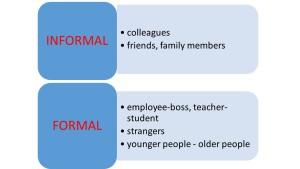Formal and informal situations – you often hear this expression when you are learning about different ways of saying things in English. Let’s read a quick note on what it really means and what the difference is between the two situations.
People in English-speaking countries often seem so informal and friendly when they communicate with others that it’s difficult to know how to show respect and when. In many other cultures there are clear language rules that show you how to speak with other people. In French, German, Russian, Romanian, or Hungarian, for example, you use different verb forms when you talk to an older person than when you talk to someone your own age. In English, however, this is not the case.
Here are some general rules to help you decide when to be INFORMAL, that is FRIENDLY, and when to be FORMAL, that is RESPECTFUL. The words ‘friendly’ and ‘respectful’ are here to help you understand this difference better. It is completely normal to be both friendly and to respect the other person at the same time. But these words illustrate well how these two situations are different.
In English we use formal language when talking to someone
-
who is older,
-
who we don’t know (e.g., a stranger)
-
who is our superior in a hierarchy (e.g., your boss, your teacher)
If you like our website, share it with friends and colleagues. Thanks!
Image courtesy of FreeDigitalPhots.net





